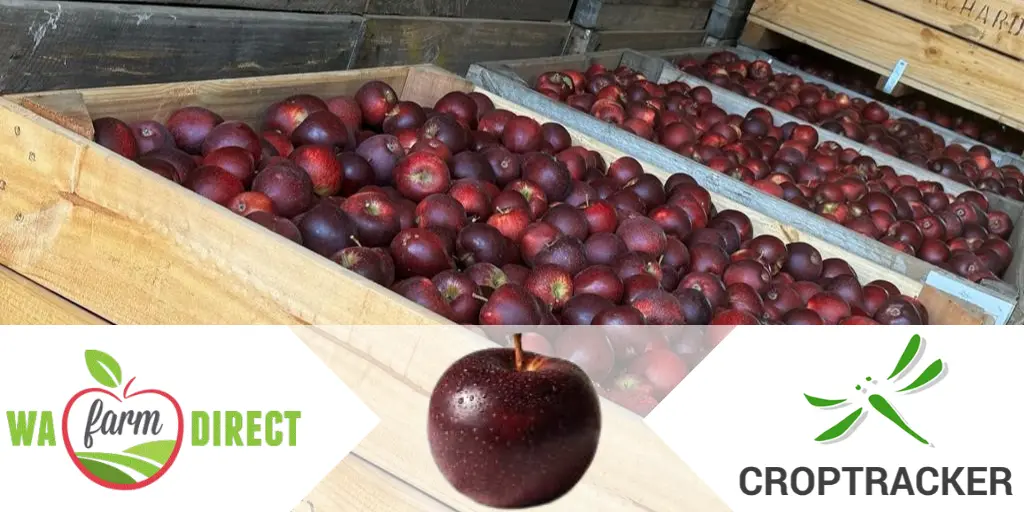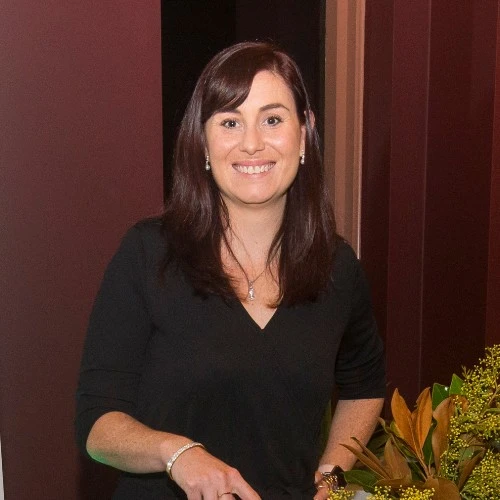This month’s Customer Spotlight is highlighting WA Farm Direct’s use of Croptracker’s Harvest Quality Vision (HQV) module. We spoke with Rebecca Blackman, Executive Manager of WA Farm Direct about how HQV helps them gain insight into their exclusive management of the ANABP 01 apple variety.
With HQV data, we are able to identify what size and colors we have to best match markets, which is really important to our sales team. Sean Engelbrecht, our [Bravo] commercialization manager, also uses the information to make data driven decisions.
Headquartered in Perth Australia, WA Farm Direct is a fresh fruit supplier and marketer. WA is a 4th generation family owned business that has worked in fresh produce since in 1915. They sell and market several branded varieties including apples, berries, stone fruit, citrus, grapes and mushrooms. They have been granted exclusive marketing licensing for the Western Australian developed ANABP 01 apple variety. ANABP 01 is sold internationally under the brand name Soluna® and domestically under the brand name Bravo®. The management and marketing of the ANABP 01 apple is the reason WA Farm Direct sought out Croptracker’s digital size and color grading system, Harvest Quality Vision. In this article we will explore some general information about managed apple varieties and how Croptracker helps users like WA Farm Direct with the tasks of brand management and sales.
Cultivar - is a particular variety of plant that is developed through close monitoring of cross breeding to create specific and consistent qualities that are maintained through the process of cultivation.
Patented Cultivar - a specific variety that has been bred and developed to have stable and unique characteristics and has been granted a patent meaning other growers cannot duplicate the process to create the cultivar without permission from the patent holder.
Club / Managed Varieties - Specific cultivars that have both a patent and an official and capitalized brand name that is regulated and marketed specifically under a trademarked name. Access to growing or selling can involve buying a license to grow and sell under the brand name from the patent/trademark holder or through gaining membership of the ‘Club’ of growers that manage the trademarked brand name. The trademark ensures the owner is able to relicense and retain rights to and limit access to the brand name of the variety even after a cultivar patent expires.
Club or managed varieties are not new to the apple industry. Standard varieties like Gala, Granny Smith and Red Delicious all have patented cultivars. And since the wild success of the Honeycrisp, a variety developed and originally patented by the University of Minnesota, growers and growing associations have been working to develop the next big branded apple. Before the expiration of the patent in 2008, every grower who planted and harvested Honeycrisp Apples needed to pay a licensing fee to the University of Minnesota, (approximately $1/tree). Driven by successful marketing and consumer demand, the Honeycrisp patent was amazingly profitable and has sparked an industry wide race to breed and market more branded apple varieties.
This race has led to some interesting challenges in the development and marketing of managed varieties. Because it takes up to 20 years to develop a new apple cultivar, a significant investment is required before the variety even has a chance to be consumer tested. Keeping a new variety’s development under wraps so that a patent can be granted is essential, which means that generally new cultivars are developed in specific growing regions, making it difficult to test its productivity in varied growing conditions. The brand manager’s job is in part to convince other growers that this new variety can grow well and profitably in their region. This involves developing appealing and marketable language about the taste, color, ‘mouth-feel’ for the end consumer and the varieties’ growing strengths like yield consistency, disease resistance, and storage qualities.
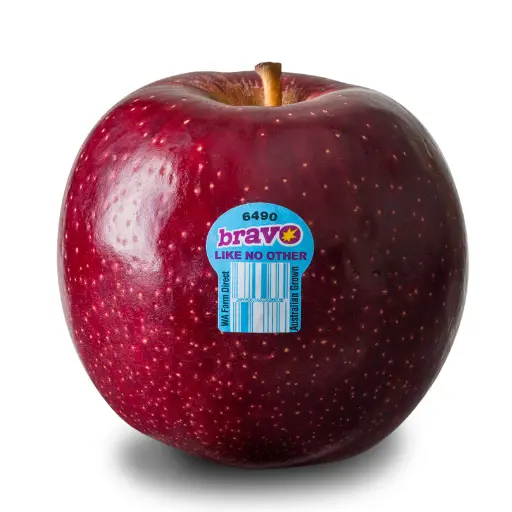
Fruit West Co-operative Ltd. is the grower cooperative that formed to commercialize the ANABP 01 variety and has tasked WA Farm Direct with day to day management and marketing under the brand names Bravo® and Soluna®. Extensive studies have been conducted to promote to growers about the benefits of investing in planting ANABP 01, like storage quality, its disease and drought resistant strengths and consistent yield. ANABP 01 also has a very unique color, eating quality and lenticel markings that have been used to help market the Bravo® and Soluna® apples to customers. They have a deep burgundy color that was developed in 1992, successful apple breeder John Cripps (creator of the Pink Lady) crossed the popular Cripps Red and Royal Gala apple varieties. It is also slow to brown making it a perfect cutting apple. WA Farm Direct works very hard to ensure that only ANABP 01 apples that meet these standards are sold under the brand names, Bravo® and Soluna®.
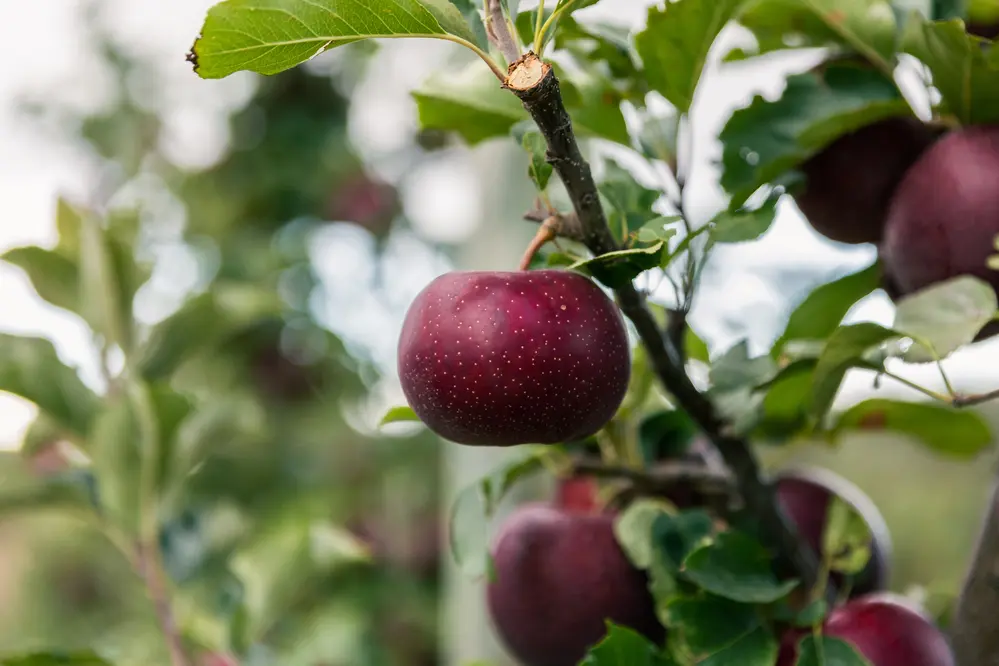
Fruit West license nurseries, growers and pack houses and then we manage the marketing of the variety. ANABP 01 goes to retail in Australia branded under Bravo® and for export as Soluna®.
Part of the way that Rebecca and the WA Farm Direct team help ensure consistency in the Bravo® and Soluna® brands is through creating and monitoring standards for color and size amongst the licensed growers and pack houses. To meet brand standards, ANABP 01 apples must have minimal yellow/green undertones and must have high coverage of the appealing dark burgundy color that Soluna/Bravo is known for. WA Farms worked closely with Croptracker to help translate these standards to digital color and size classes used in Harvest Quality Vision. Using Croptracker’s mobile app, several licensed Bravo/Soluna pack houses in Australia take HQV scans on sample bins from incoming fruit before it is packed or stored.
Getting access to size and color information quickly and efficiently has made a big difference. Rather than waiting a day for results [from the pack line], we can see the scans in 3 minutes and we run reports and get information right away.
WA Farm Direct makes good use of the scan review screen available in Croptracker’s web application. After the licensed pack houses scan their incoming ANABP 01 bins, Rebecca and her team review both the scan reconstruction, and the color histogram chart to get a detailed idea of the color and quality of fruit headed into storage before packing. This helps Sean and his team organize the storage holding inventory so they know what is available and best suited for export and domestic markets. Certain international retail markets will purchase specific sizes so WA Farm Direct is able to ensure they have enough to fulfill orders for export. Having visibility into sealed CA rooms so that expensive international shipments can be organized with as much lead time as possible is incredibly valuable to the program.
Moving forward with Croptracker, WA Farm directly hopes to get more of their pack houses to scan Bravo/Soluna before storage and packing so they have full inventory clarity. They also hope to expand HQV use to their managed apple and tree fruit varieties including other apple varieties whilst investigating the usage of the system for their newest flat nectarine and peach varieties sold under the Ondine brand. WA Farm Direct has highlighted how useful it has been to have direct customer support from Croptracker to help them meet their goals with the software.
Being able to say this is what we need and having real-time meetings and feedback to grow the system and learn with it has been really useful. Obviously the color intensity was something that was really important to us and was not something that was set up to do in the beginning, but being able to work through what we needed and what the system could do to be able to get to an outcome which suited both of us has been amazing.
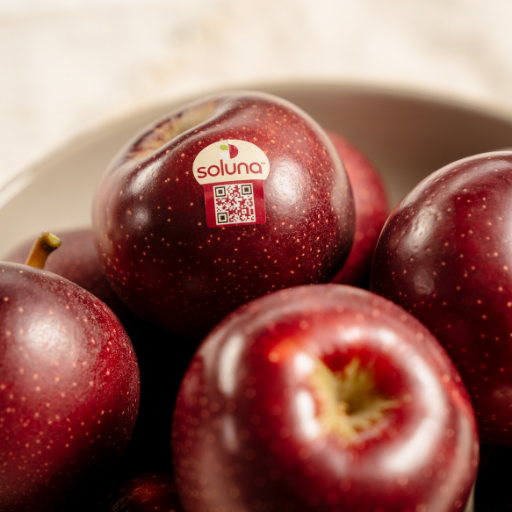
WA Farm Direct's implementation of Croptracker’s Harvest Quality Vision (HQV) module has significantly enhanced their ability to manage and market the ANABP 01 apple variety under the Bravo® and Soluna® brands. By leveraging HQV’s digital size and color grading system, WA Farm Direct ensures consistency in their product standards, which is crucial for meeting the demands of both domestic and international markets. The real-time data provided by HQV allows for more efficient inventory management and decision-making, leading to better fulfillment of market-specific requirements. WA Farm Direct aims to expand the use of HQV across more pack houses and additional fruit varieties, further illustrating the pivotal role of Croptracker’s technology in their strategic growth and operational efficiency.
